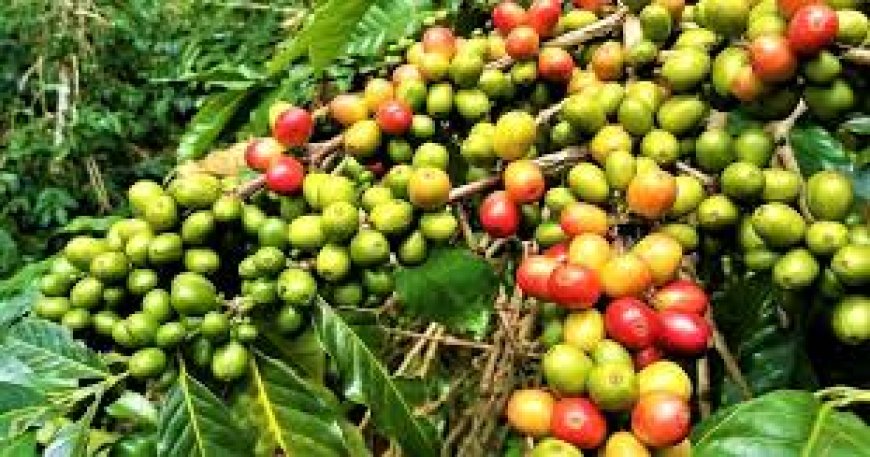A coffee bush at harvesting time

Nakuru,
Tuesday January 9, 2024
KNA by Jane Ngugi and Jedidah Gitau
The County government of Nakuru has affirmed that it will not relent on supporting the national government’s initiative in reforming the coffee sub-sector in a bid to rein in cartels.
The devolved unit has indicated that it is supportive of President William Ruto’s administration's resolve to get rid of private profiteers who have controlled the market and manipulated coffee prices.
County Executive Committee Member (CECM) in charge of Agriculture, Fisheries and Livestock Mr Leonard Bor further announced that the County Government had launched a major drive to revive growing of coffee on commercial scale in the devolved unit.
Mr Bor said towards achieving this objective the County administration was supporting coffee cooperative societies and unions to access resources and training programs.
Speaking during a meeting with officials of Nakuru Coffee Union led by its Chairman Mr Peter Wanyeki, the CECM noted that, despite dwindling production of the cash crop in the country occasioned by mismanagement and unexploited potential in the sub sector as well as land subdivision for real estate development, demand for Kenya’s coffee at global market remained high.
Nakuru Coffee Union is composed of eight cooperative societies drawn from Bahati, Subukia and Rongai sub counties with more than 1100 farmers.
Mr Bor indicated that Governor Susan Kihika’s administration was debunking the myth that coffee was a Mount Kenya crop.
The CECM who was flanked by Agriculture Chief Officer Mr Newton Mwaura, County Director for Agriculture, Fredrick Owino and Isaac Kiptoo from the Co-operative Bank of Kenya noted that Nakuru County had a huge untapped potential to grow Arabica coffee which is highly popular at domestic and global markets.
The latest International Coffee Organization report, says although Kenyan coffee is so little in the global scene, it is still fetching the highest price and is the most sought after.
Statistics from the devolved unit’s department of Agriculture reveal that over 2,686 acres in the County are under the crop with small scale farmers owning 666 acres and the rest in the hands of large estates.
“We are exploring possibilities of our younger generation being incorporated in the coffee value chain. They need to be trained on roasting coffee and sell our own branded finished products,” added Mr Bor.
The Kenya Kwanza administration has embarked on a coffee sector reform journey, hoping that it can take on the challenges crippling the once vibrant industry.
Under the new reforms, 11 coffee Cooperative unions have been licensed to sell coffee directly at the Nairobi Coffee Exchange (NCE) and overseas thereby eliminating the need for a middleman between the farmer and the buyer.
Under the new changes, the Capital Markets Authority (CMA) has also been entrenched as the regulator of the Nairobi Coffee Exchange (NCE) where Dr Ruto’s administration expects that the regulator will oversee a transparent and efficient price discovery process that benefits farmers.
The entry of farmer-owned coffee brokerage companies on the NCE trading floor has been billed as a game changer by Dr Ruto’s government.
Mr Bor stated that Governor Kihika’s focus was to equip coffee growers especially the youth with skills on good agricultural practices to increase their average acreage by 50 acres this year and production from two kilograms to 12 kilograms per bush per year.
Coffee is grown in the three sub-counties of Subukia, Bahati and Rongai. Except for Patel Farm in Solai which brands and exports its coffee to the European Union, the cash crop is mainly grown by small holder farmers in the County.
The devolved unit under the aegis of Nakuru Coffee Forum is now working with several agro-chemical companies and seven coffee farmers co-operatives including Kiremba, Solai ,Mandizi, Mutungati, Wikurie, Demu and Jumatatu.
The coffee subsector in the county experienced a downward spiral occasioned by crumbling infrastructure, sheer mismanagement and neglect by previous administrations, poor marketing strategies and inferior agronomical practices.
“Our ultimate goal is to streamline this subsector and have coffee branded in Nakuru destined for export markets. The subsector has potential to expand and create job opportunities. Our coffee has the potential of fetching up to Sh 1,000 per kilogram due to its high quality. There is every reason for farmers to grow more coffee,” said the CECM.
He observed that Coffee farmers in Nakuru have big farms for expansion unlike other traditional areas such as Nairobi and Central Kenya where real estate and industries have gobbled up huge chunks of land.
“Apart from financial and seedling support, we want to improve the production per coffee bush. The Current yield of two kilograms they are producing is below par. With proper agronomical practices a bush has the potential to yield as high as twenty kilograms,’’ he added.
Agricultural experts contend that the County’s volcanic soil is ideal for coffee growing and the world’s favourite Arabica coffee flourishes in the region.
More than 800,000 farmers are employed by the industry and continue to suffer low incomes due to a dysfunctional system that appears to favour middlemen and other “cartel” members.
President Ruto moved the coffee reforms docket to the Deputy President Rigathi Gachagua’s office.
It was previously under the Executive Office of the President.
Coffee was at some point a leading foreign exchange earner, accounting for 40 per cent of forex earnings. The crop raked in Sh27 billion in 2022, a notable increase from Sh10 billion in 2020.
Coffee production stood at 52,000 tonnes in 2022, according to data by the Kenya National Bureau of Statistics (KNBS).
Coffee farmers are further set for a major boost after the government announced plans to inject Sh4 billion into the New Kenya Planters Cooperative Union (KPCU) to enhance the Coffee Cherry Revolving Fund.
This will increase the coffee advance payment price from Sh20 per kilo of cherry to Sh80 per kilo.
Cabinet Secretary for Cooperatives and Small and Medium Enterprises Simon Chelugui indicated that the move is part of efforts to ensure farmers are well facilitated through subsidized inputs that will allow them to produce 15kg per bush.
The Deputy President recently indicated that prominent global coffee companies, including Starbucks and Java Coffee Company, have expressed a strong interest in directly purchasing coffee from local farmers.
These initiatives aim to enhance farmers’ earnings and uplift their financial well-being.
Kenyan coffee is among the most celebrated in the world due to its complex flavour and aroma.
Developments at NCE have equally reignited hope among farmers that the once-thriving coffee sector is on the path to recovery.
Courtesy; KNA
What's Your Reaction?

































































































































































































































































































